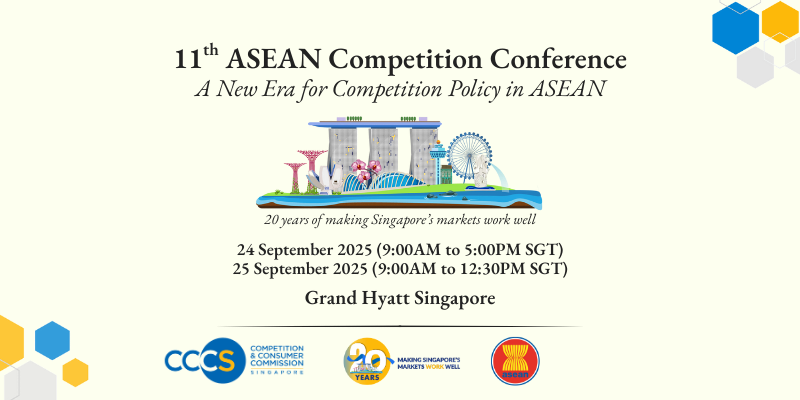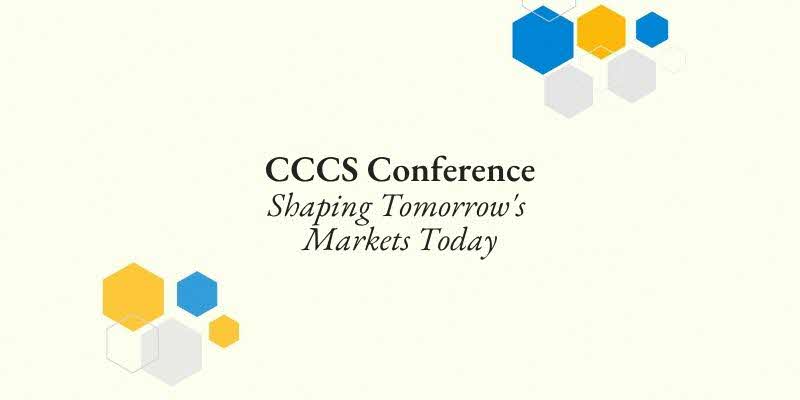- Home
- 11th ASEAN Competition Conference: A New Era for Competition Policy in ASEAN
11th ASEAN Competition Conference: A New Era for Competition Policy in ASEAN
The conference will discuss how competition policy and enforcement can be harnessed to build a more resilient and inclusive regional economy, as well as look into how the benefits of globalisation and regional integration can be distributed equitably.

About the 11th ASEAN Competition Conference
Singapore will host the "11th ASEAN Competition Conference (ACC): A New Era for Competition Policy in ASEAN" on 24 and 25 September 2025.
The ACC is the flagship event of the ASEAN Experts Group on Competition (AEGC) and serves as a key platform for the competition community in ASEAN to discuss recent developments in the region, share best practices on addressing competition issues, and to network and deepen relationships with each other. The conference will bring together various stakeholders, including policymakers, business leaders, competition practitioners, the judiciary, academics, as well as international partners to engage in a dynamic discussion on the latest competition policy developments in ASEAN.
In today’s globalised economy, Global Value Chains (GVCs) form the backbone of goods and services production. The COVID-19 pandemic served as a stark wake-up call, which underscored the critical importance of GVC resilience for economies around the world. The need for such resilience has been further amplified by recent global geopolitical and trade tensions as well as rising tariff barriers, which continue to impact international trade patterns. To withstand future disruptions, economies must adapt, diversify, and capitalise on new opportunities to strengthen their resilience. A more resilient ASEAN economy, one that can absorb shocks and rapidly reconfigure, could generate US$460-540 billion in net economic value and 12 million new jobs by 2030.
Central to achieving this resilience is the establishment of robust competition frameworks that enable businesses of all sizes, particularly Micro, Small, and Medium Enterprises (MSMEs), to participate meaningfully in GVCs. Fair competition and effective enforcement of competition laws are essential to create a level playing field, facilitating the integration of ASEAN businesses into regional and global trade networks. This has become even more crucial for ASEAN in the current geopolitical and trade environment.
The 11th ASEAN Competition Conference, themed “A New Era for Competition Policy in ASEAN”, will explore how competition policy and enforcement can be harnessed to build a more resilient and inclusive regional economy. The conference will explore strategic approaches to ensure that the benefits of globalisation and regional integration are equitably distributed across ASEAN member states, fostering sustainable economic growth and development.

Opening Remarks
Plenary Session 1: Regional Cooperation on Competition Policy and Law in ASEAN: Strengthening International Partnerships
As ASEAN economies become increasingly integrated and digital markets transcend national boundaries, effective regional cooperation in competition law enforcement has never been more critical. This session brings together senior competition officials and international experts to examine ASEAN’s transformative initiatives in competition policy and law. The discussion will focus on key regional initiatives, including the ASEAN Competition Action Plan (ACAP) 2030, ASEAN Merger Information Sharing Portal (MISP), and the ASEAN Framework Agreement on Competition (AFAC). Panellists will share insights on emerging enforcement challenges, including those in digital markets, cross-border mergers, and international cartels.
Building on ASEAN's achievements in regional cooperation, panelists will explore practical approaches to building a more competitive and integrated ASEAN economic community, and the role of international cooperation in supporting the ASEAN Experts Group on Competition (AEGC) in implementing competition law and facilitating cross-border engagements.
Coffee Break
Plenary Session 2: Measuring the Impact of Competition Policy on Economic Growth
Competition policy plays a vital role in promoting economic growth and development, driving market efficiency, spurring innovation, and ensuring fair business practices. The session will examine how competition policy contributes to economic growth through different means. In particular, it will address how competition policy supports economic growth through greater productivity and innovation, as well as the role of competition law in ensuring that businesses have fair access to markets.
Through analysis of enforcement cases and existing competition frameworks, panellists will explore how competition law enforcement catalyses productivity gains and fosters innovations while ensuring equitable market access. The discussion will also address practical challenges in measuring policy effectiveness and share insights on how competition authorities can align enforcement strategies with broader economic development goals.
Lunch Break
Plenary Session 3: Facilitating Access by ASEAN MSMEs to Global Markets through Competition Policy
ASEAN aims to create a single market and production base, with ASEAN businesses integrated into Global Value Chains (GVCs) where competitive markets enable firms of all sizes to participate effectively and capture greater economic value. In particular, panellists will address how robust competition frameworks can create opportunities for Micro, Small, and Medium Enterprises (MSMEs) to help them integrate into global markets and move up the value chain through increased productivity and technological upgrading, whilst addressing market distortions that traditionally favour larger incumbents.
This session will raise awareness about the importance of competition policy in supporting MSMEs, and provide a platform for policymakers, competition experts, and MSME representatives to discuss and develop best practices on enhancing MSME participation in GVCs. Panelists will share insights on how competition policy can address specific challenges faced by MSMEs, including access to digital platforms or distribution networks. The discussion will also explore practical examples from ASEAN member states where competition enforcement has successfully enhanced MSME market access and competitiveness.
Coffee Break
Plenary Session 4: Leveraging Artificial Intelligence for ASEAN
Artificial intelligence introduces complex competition issues, including data dominance leading to winner-takes-all dynamics and barriers to entry, algorithmic bias that can reinforce inequalities and enable anti-competitive pricing, new forms of collusion through algorithmic coordination, and predatory innovation that limits competition. The rise of AI-powered platforms also creates gatekeeping issues. On the other hand, artificial intelligence can be leveraged to promote fair markets by enhancing market monitoring, improving transparency, and empowering consumers and smaller businesses. AI-powered surveillance can detect anti-competitive practices, while AI-driven tools can provide greater price transparency and access to market information. Ultimately, AI requires proactive policy responses to ensure its positive impact, fostering innovation while addressing ethical considerations, promoting equitable access, and safeguarding against potential risks.

Plenary Session 5: Competition and Consumer Protection
Competition and consumer protection policies are complementary tools that promote well-functioning markets and enhance consumer welfare. While competition law focuses on preventing anti-competitive practices that restrict market access and harm consumers indirectly, consumer protection directly safeguards consumer rights and interests in their dealings with businesses.
The session will explore the synergies between competition and consumer protection enforcement, including how a combination of both can better address market failures and enhance economic efficiency. Panellists will also discuss practical approaches to strengthening this interface, particularly in digital markets where the boundaries between competition and consumer issues are increasingly blurred. The discussion will focus on how competition and consumer authorities can collaborate more effectively to promote market transparency, prevent unfair practices, and empower consumers to drive competitive outcomes.
Coffee Break
Plenary Session 6: The Role of Competition in Managing Cost of Living
Rising costs of living represent a significant challenge for many economies in ASEAN. This session will explore how competition enforcement or policy can play a role in addressing cost of living issues by promoting greater market efficiency and preventing price distortions due to anti-competitive practices. The discussion will examine how competition authorities can effectively identify, investigate, and address market distortions that may exacerbate cost of living concerns.
This session will bring together academics and policymakers to analyse how robust competition laws can protect consumers and foster economic resilience. Panellists will examine the delicate balance between addressing immediate price pressures and maintaining long-term market efficiency and innovation incentives. The discussion will focus on practical approaches competition authorities can take to promote competitive markets while avoiding unintended consequences of intervention.
Closing Remarks

